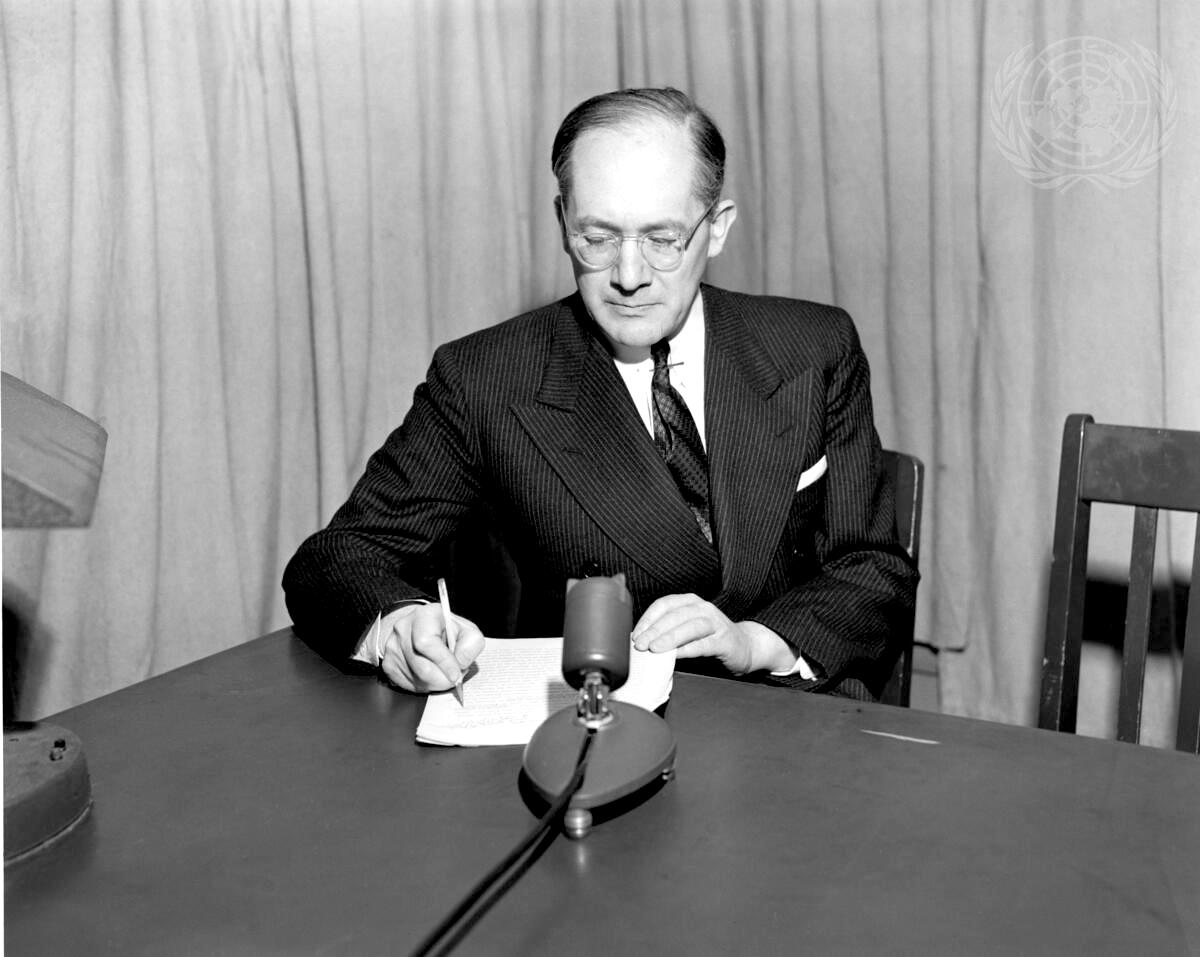Raphael Lemkin’s application of the term genocide to the Ottoman Turk’s systematic mass slaughter of the Armenians predated the Holocaust, write Mischa Geracoulis and Heidi Boghosian.

Detail on The New York Times‘ building on 8th Avenue. (Kevin Prichard Photography, Wikimedia Commons, CC BY-SA 2.0)
By Mischa Geracoulis and Heidi Boghosian
Common Dreams

 On Jan. 11, The New York Times published an article by Isabel Kershner and John Eligon titled “At World Court, Israel to Confront Accusations of Genocide.”
On Jan. 11, The New York Times published an article by Isabel Kershner and John Eligon titled “At World Court, Israel to Confront Accusations of Genocide.”
From the standpoint of critical media literacy and ethical journalistic practices, the article exhibits framing biases, historical and contextual omissions and overly simplistic reasoning that attempts to explain why “Israel has categorically rejected the allegations being brought this week in the International Court of Justice by South Africa.”
We assert that this editorial spin does a disservice to journalism and adds to a faulty record that enables human rights violators.
The overall tone is in lockstep with corporate media’s bias toward Israel — a bias credibly substantiated by the likes of the Lemkin Institute for the Prevention of Genocide, The Intercept, The Guardian, Mint Press News and Common Dreams. While multiple aspects of the article are troublesome, the third sentence provoked our immediate response letter to The New York Times. That sentence is as follows.
“Genocide, the term first employed by a Polish lawyer of Jewish descent in 1944 to describe the Nazis’ systematic murder of about six million Jews and others based on their ethnicity, is among the most serious crimes of which a country can be accused.”

Raphael Lemkin, who coined the word “genocide” on Sept. 12, 1948. (UN Photo)
Days later, echoing a similar mischaracterization of Raphael Lemkin’s work, USA Today published a piece by Noa Tisby titled, “Is Israel guilty of genocide in Gaza? Why the accusation at the UN is unfounded” (Jan. 16).
Tisby’s article, like that of Kershner and Eligon, amended the breadth and depth of Lemkin’s work to accommodate a particular narrative.
Considering The New York Times’ reputation as a leading U.S. paper of record, the need for public correction therein took precedence over the op-ed in USA Today. Hence, our letter:
“As two Armenian Americans who grew up in the shadow of the 20th century’s first genocide, an attorney and a media expert respectively, we found critical context lacking in ‘At World Court, Israel to Confront Accusations of Genocide,’ by Isabel Kershner and John Eligon (January 11). Any discussion of genocide and Raphael Lemkin is grossly incomplete without citing how the Armenian genocide informed the Polish-Jewish lawyer’s noble work.
Lemkin (b. 1900), while a university student in the 1920s, learned of the Ottoman Turk’s coordinated mass slaughter of Armenians that culminated in 1915. The extermination of Armenians informed Lemkin’s life mission to establish international laws and treaties making genocide a punishable offense. In 1944, Lemkin finally named that crime genocide.
This article implies that Lemkin advocated solely for the Jewish cause. A humanitarian first, Lemkin sought to establish protections for all people. For example, he worked with Algerians who sought to hold accountable their colonizers for crimes against humanity.
The Armenian Genocide impelled Lemkin to action. Absent this historical context, the article reinforces the Israeli government’s illogical claim that Jewish people are the sole victims of genocide. South Africa’s charge that the Israeli government is engaging in genocide reflects Lemkin’s commitment to the denunciation of the crime irrespective of ethnicity.”
The New York Times ignored our letter.
Oversimplifying Lemkin’s endeavors does a shameful disservice to his legacy. Such a decontextualized presentation edits out the foundation of his body of work and contracts the character of his mission.
It ignores the events that prompted and preoccupied his thinking on international discourse toward establishing laws against the crime that he came to term “genocide.”
Lemkin was horrified that the Ottoman Turkish government could kill its own citizens — albeit “dhimmi,” or second-class citizens — with impunity.
His application of the term genocide to the Ottoman Turk’s systematic mass slaughter of the Armenians predated the Holocaust. Years later, as a formidable advisor to prosecutors at the Nuremberg Trials, Lemkin drew conclusive parallels to the Nazis’ genocidal massacre of Europe’s Jewish citizens.

Armenian quarter in the Old City of Jerusalem, 2009. (Deror avi, Wikimedia Commons, CC BY-SA 3.0)
Editing the Armenian Genocide from Lemkin’s life work has contemporary and historical implications. In light of increasing attacks by a radicalized right-wing contingency in Israel on Jerusalem’s Armenians, deleting the Armenians from current reporting sets a dangerous tone for Armenians living under current threat.
The Lemkin Institute for Genocide Prevention has featured articles on Armenphobia and on the Armenians’ right to exist, and has issued statements of concern over recent attacks on the Armenian Quarter of Jerusalem.
Jerusalem’s Armenians, or “East Jerusalemites” as they are designated by the Israeli government, like other Palestinians, live in a system that privileges Israel’s Jewish population.
Hostilities from Jewish fundamentalists toward Armenians in Jerusalem are nothing new. However, the level and frequency of aggressions have intensified thanks to Netanyahu’s far-right government which has energized and normalized them.
With attention concentrated on Gaza, Israeli extremists are free to act without fear of consequences. The Lemkin Institute explained that this can be “viewed as another attempt by Israeli extremists to create a homogenized Jewish ethnostate in the Palestinian territories.”
The New York Times article’s abridged version of Lemkin’s work emboldens those who continue to deny that the 1915 Armenian Genocide occurred. To selectively invoke Lemkin’s work on genocide as a defense against the charges brought against Israel banks on the idea that public memory is short.
A well-worn quote reported by A.P.’s Berlin bureau chief, Louis Lochner, from a speech given by Hitler to his military generals before the 1939 Nazi invasion of Poland rhetorically asked, “Who today, after all, remembers the annihilation of the Armenians?”
With hot wars blazing and existential alarms blasting, we not only remember the Armenians but uphold this New York Times article as a cautionary tale that words matter.
Mischa Geracoulis is a media literacy expert, writer and educator, serving as Project Censored’s curriculum development coordinator, and on the editorial boards of the Censored Press and The Markaz Review.
Heidi Boghosian is an attorney and is the executive director of the A.J. Muste Memorial Institute. Previously she was the executive director of the National Lawyers Guild, a progressive bar association established in 1937, where she oversaw the legal defense of people targeted by government. She also co-hosts the weekly civil liberties radio show “Law and Disorder,” which is based out of Pacifica Radio’s WBAI, New York, and is broadcast to more than 25 states on over 60 nationally affiliated stations.
This article is from Common Dreams.
Views expressed in this article and may or may not reflect those of Consortium News.

I no longer trust The New York Times.
I think that the New York Times was once a good newspaper—but I no longer trust them for their lies and abuse towards other nations.
Perhaps New York CRIMES would be a better name for the paper.
Could you imagine the possibility of publications like the New York Times or the Washington Post, telling the truth if it conflicts with their ideology. Even when confronted with overwhelming evidence, they manage to twist the truth to muddy the waters and I expect that each and every journalist of these publications know what they have to do without being told. Stretching credulity to the limit though, they may well believe what they write, but if they believed any different they would not be writing for either The New York Times or The Washington Post.
John Pilger wrote, “The news is only a facade, blemished to a large extent by ideology, partiality and lies. To understand the truth in any situation it is necessary to research your subject, to dig deep, look to history, it’s context and judge events accordingly. It is true that it is near impossible to be impartial if you know the truth. Let your judgement be based on a well informed conscience. The more you inquire the more likely you will find the truth.” Arriving at the truth is sometimes hard work, but liberating nonetheless.
Thalerhof concentration camp 1914
“A well-worn quote reported by A.P.’s Berlin bureau chief, Louis Lochner, from a speech given by Hitler to his military generals before the 1939 Nazi invasion of Poland rhetorically asked, “Who today, after all, remembers the annihilation of the Armenians?””
I was thinking of that quote from Hitler the entire time I was reading this article. I’m glad you included it. Strange that the Zionists committing genocide in Gaza don’t remember it when it’s so famous. Strange that people in multiple governments seeking to gaslight the entire world about it this time around don’t remember it. Let’s hope they never have to on the basis of the obvious logic it so clearly infers.
The Israeli zionists do Jews no favours in politicising the nazi holocaust. They just cheapen it and leave the door open for deniers. Of course, that is probably part of their agenda !
This was a good letter to the NYT, but it should not have described the Armenian genocide as the first of the 20th century. The genocide in German-ruled Namibia predated it by a decade and was a direct model for the genocides carried out by Germany three dacades later.
The government of Namibia has specifically evoked this earlier genocide in their land, in their statement in support of South Africa’s case against Israel.
Thank you Mischa, Heidi and Rafael for your constructive criticism of the NY Times article. Inaccurate reporting should always be corrected.
Given the term “Genocide” was first coined in 1948 by Raphael Lemkin who was primarily concerned with the extermination of European Jews… it is not unreasonable to extrapolate the term to other mass murders by one group of humans against another. I appreciate the expression “the Armenian genocide was the first of the 20th century”…and the exception in Namibia. My knowledge of history is limited….but I don’t think it’s stretch to state that humans have behaved this way to other humans forever….if they have had the opportunity and think they can get away with it. The term may be new….mass murder is not.
What is new,.. is our appreciation that we live on a finite planet, that we are ” A Family of Man” and we can all be informed of each others actions almost instantly. Mass murderers can no longer conceal their horrendous actions. The entire world has collectively voted to outlaw this behavior. But one group of humans still think they are smarter than the rest of us. They think they can get away with their mass murder by restricting the term “Genocide” to one single event in “their” history. They seek to franchise the term.
Call the Israeli murder of the Palestinians by what ever term you want….it’s still MASS MURDER…for the express purpose of exterminating a human community and expropriating their land.
Our World Family cannot stand by while this genocide takes place. We all know this but we are finding it difficult to prove it in court. The defendant should be ashamed…but is not. Their council concocts legal excuses. We wonder why there is no remorse. We might wonder if they are the same species.
Now that establishment media has merged with the state, it not surprisingly acts the same as the state. Those crafting the daily narrative of empire believe as the empire managers believe that they are beyond the reach of accountability. The human ego can be turned into a frightening instrument of criminality when too much power is acquired. Will we ever learn to limit the amount of power a handful of humans have over the rest?